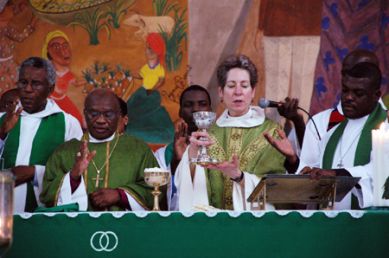Haitian Episcopalians Pledge to Continue 'Gospel of Wholeness'

Missionaries and natives of the L'Eglise Episcopale d'Haiti (Episcopal Church in Haiti) have pledged to continue their work in preaching and practicing the "gospel of wholeness" as the 150th anniversary of the church approaches.
"For 149 years the diocese has taken the lead in caring for the people of Haiti through our schools, through our medical clinics, our feeding programs, our water programs, through our churches, through the music program, through taking care of abandoned handicapped children. Everything we have done for 149 years we will do for another 149 years," the Rev. Lauren Stanley, missionary to L'Eglise Episcopale d'Haiti told Episcopal News Service (ENS)
Stanley, who was at home in Virginia when the quake hit, is currently coordinating relief efforts between the diocese in Haiti and the church in the U.S.
She is in frequent contact with Haitian Church leader Bishop Jean Zaché Duracin, who previously denied requests to be evacuated from the region in order to "stay with my people."
Duracin is currently helping coordinate efforts to care for nearly 23,000 of the quake's victims in temporary shelters.
During a special Eucharist service with Presiding Bishop Katharine Jefferts Schori, Duracin noted last that the "gospel of wholeness" is something that the church has practiced since its founding in 1861.
Such a gospel "can serve people in their body, their mind and their spirit," Duracin said, according to ENS.
During her sermon, Schori noted that the diocese's work requires, "courageous and whole-hearted investment in something that leads to more abundant life."
"That is what Jesus asks of each and every one of us -- full investment in a world that looks more like God's dream," she said
Episcopalians have touched the lives of Haitians in a truly holistic way - running churches, medical centers, agricultural and reforestation projects, micro-financing services, and even a philharmonic orchestra and children's choir, which performed in the now toppled Holy Trinity Cathedral.
Prior to the earthquake, the church had also run a network of 254 schools, which educated more than 80,000 Haitians from the preschool to the university level.
Stanley said such services are a showing that the diocese is committed to all of the people of Haiti, "not just Episcopalians in our pews."
The group will rebuild its schools, hospitals and churches and "will continue to care for the people that nobody else cares about because that's what we have always done," she told ENS.